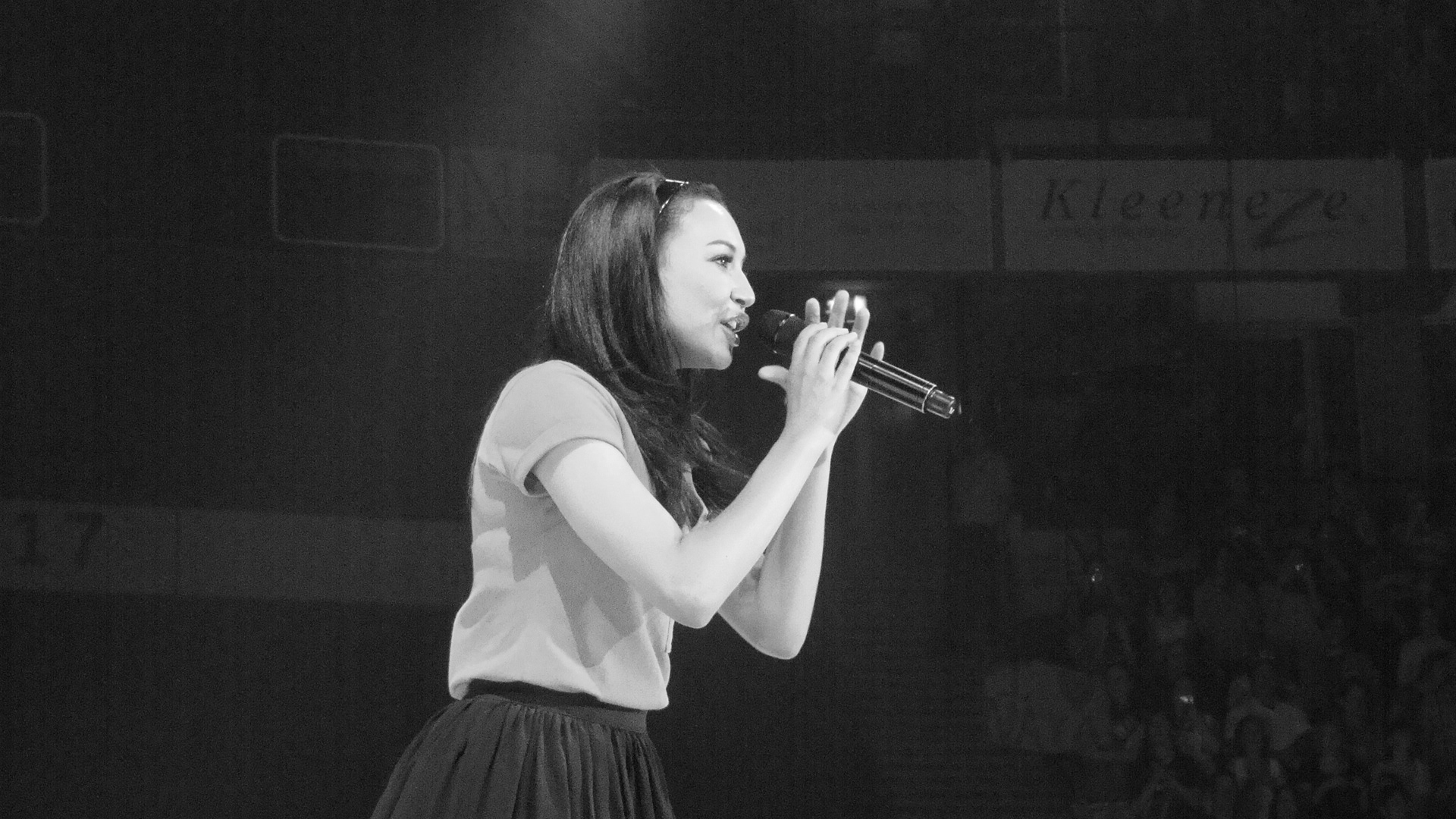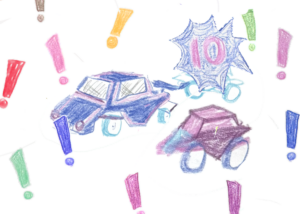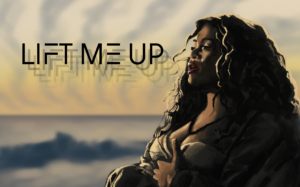Dajour:
Naya Rivera landed her first major acting role at the age of four on the short-lived Black sitcom The Royal Family. In an Arsenio Hall interview for the show, Hall asks young Naya if she would like to do some modeling and without missing a beat she replies “I did that.” (Because of course she already has. Duh!) The audience laughs and cheers and it’s clear this young girl is something special.
And something special she was. I wasn’t even born yet when Naya began her acting career, but I can distinctly remember watching reruns of Family Matters where she played 7-year-old Gwendolyn. She’d walk in, her long, curly hair usually tied half up in a big scrunchie and blow a kiss or give a wink, delivering her lines with an undeniable magnetism and charm that was impossible to forget. A scene-stealer from the very beginning, and this would follow her years later to her break-out role: Santana Lopez.
Santana started Glee as a recurring character, meant simply to be the meaner, bitchier Latina sidekick to head cheerleader Quinn Fabray (Dianna Agron). But, once again, she stole every scene she was in. Her star was simply too bright to relegate to the side and she was soon promoted to series regular.
Santana became a fan favorite cultural icon, but let’s be clear: Naya made this so. Her comedic timing and ability to deliver a long biting monologue tinged with insults, to be scary as the mean girl yet vulnerable and heartbreaking as a closeted lesbian in love with a girl (Heather Morris) who she’s scared doesn’t love her back was unmatched. And her voice, God her voice. Powerful, raspy, entirely unique, Naya was responsible for some of Glee’s best, most beloved, and memorable musical numbers (hello, “Valerie”!).
With Santana, young queer girls (especially those of color) saw themselves, their fears, their vulnerabilities on screen, many for the first time. And Naya championed this visibility. Back in 2010 during my Glee obsessed days, I’d watch hours of cast interviews and was always in awe of how Naya spoke about her character—so much love, passion, and appreciation for the young queer fans who sent her letters saying how much she meant to them. She backed Santana and Brittany’s (best known as “Brittana”) relationship from the beginning, always saying she wanted Santana to end up with her. She knew the power of showcasing a young lesbian of color on network television, and it would not have been successful without the respect, care, and love she brought to the role. Through this, without exaggeration, she saved lives.
Exactly one year ago, on Monday, July 13th, Naya’s body was recovered from Lake Piru. The world lost a great talent, a force, a mother, a daughter, a friend, a life.
As fans, we mourn the loss of a life we never actually knew, but one that has touched ours in so many ways. One we connected with, in whatever form that takes. It’s different and personal for everyone, but forever true.
As fans, our hearts remain with her family, with her friends, with her sweet boy Josey and all those who were so fortunate enough to know her in this lifetime. And as fans, we honor and celebrate her life as best as we can.
Rest easy Naya, you were loved by so many, so many you never even knew. Here’s a few fans’ small tribute to you.
—Dajour Evans
Max:
Naya Rivera was the heartbeat of a show instrumental to my personhood.
At times, loving Glee comes with a pound of shame—I would be lying if I said I hadn’t put it down numerous times under “guilty pleasures.” Its plot holes frequently comically terrible and its character development arcs often iconically ridiculous, Glee was a cultural phenomenon without much of the meat necessary to back it up. This being said, Glee is an inextricable part of my adolescence and personal development. A glossy catalogue of pop culture and a willing frank treatment of social issues (though the subtlety of the delivery of these themes is questionable at best), Glee was an introductory point to musical exploration and ideological development alike. Sure, Glee wasn’t always the best written show—but its willingness to bring taboo after taboo to the forefront on mainstream television was remarkable, beautiful, and incredibly impactful to a young adult like myself just beginning to feel out the contours of his personhood. My music taste, too, is somewhat moored to Glee to this day—the original versions of some of its best covers (“Shake it Out,” “We Are Young,” “How Will I Know”) are key to my present musical identity.
I started the show in 2012—season three—and the first episode I ever watched was episode seven: “I Kissed a Girl.” The episode itself is unremarkable—a dud in a season I (unpopularly) still believe is the best in the series—but its central plotline revolves around Naya’s Santana Lopez and her path towards self-acceptance as a lesbian woman. The emotional core of the episode sits strongest on Naya’s chest, and she delivers: the scene where she admits the truth to her grandmother is a pivotal moment in series history because Naya knocks it out of the ballpark. Her incredulous and yet tragic expression of emotions is accessible to anyone with a coming out story that is less than perfect.
I soon learned that Naya would continue to be the backbone of a show that put so much on their actors to deliver. As so many tributes to her mention, Glee never intended Santana to become a central axiom; it was Naya’s charisma, talent, and emotional force that made her so vivid on the screen. And colorful she was. From her impeccable delivery of Santana’s wildest monologues (“Maybe Blaine got tired of hearing your shrill, self-aggrandizing lecture about how you felt the two of you were at the very apex of the gay rights movement every time you so much as cooked macaroni and cheese together … or farted.” key among them) to her ability to emote more authentically and consistently than almost any other person on the show, Naya was so good at making Glee feel like something irreverent and important at the same time.
Naya, we miss you. You inspired so many—with your bravery, your love, your talent, and your confidence. I drew from Santana so much power and joy; without her—and therefore you—I would be a markedly different person today. Perhaps even more importantly, I found clarity. Your color and sound made my own ring so much brighter, and I’ll be eternally grateful for it.
Rest easy.
—Max Zhang
Olivia:
It is impossible for me to remember my middle school years without at once remembering sitting in my basement with my mother watching Glee. Where she (and nearly everyone around me) saw my interest in the show as a typical preteen obsession, I knew that it was deeper than that. Though Glee may have quickly become outdated and perhaps the triviality of the show is the most remarkable thing about it, it was the first show in which I ever saw pieces of myself portrayed on screen.
The reasons I connected with Glee more than I had anything before were simple: a. the exposure to so, so much music, b. its satirical nature, and c. Santana Lopez. Before her, I didn’t have the words to describe how I felt, who I was. She gave them to me, once I reached season 3: “I love girls the way I’m supposed to feel about boys.” Naya’s portrayal of Santana quite literally changed my life in that it provided me the vocabulary (and the strength) to understand myself.
Of course, it would be silly to only speak of the character when Naya herself also supported and changed me so. Throughout my time as a “Gleek,” I watched countless interviews with her and other cast members. I was always drawn to the way she spoke about her influence, surprised that her portrayal of Santana resonated with so many folks. Her humility and her willingness to become a source of inspiration, love, and light for her fans meant more to me than I ever told anyone. Thinking back on that time period in my life, I realize that she single handedly supported much of my own self-acceptance. Even now, in moments when I need a friend, I think back to some of those interviews.
Over the past few weeks, I have been thinking so much about what to say about Naya on the one-year anniversary of her tragic death, but it’s hard to sum up your feelings about someone that you don’t even know personally but who somehow means the world to you. So instead of saying anything, I’ve been rewatching Glee episodes. Somehow, it feels like a kind of mourning for Naya and for my childhood. But so many moments have made me smile—after all, Glee is rife with comedy and incredible characters. Hearing Naya sing “Trouty Mouth” to her then-boyfriend Sam Evans again felt like coming home to laughter and familiar banter.
In the words of Rachel Berry, because sometimes (in my head, at least) the writers of Glee put it best, “being a part of something special makes you special, right?” I would like to think that somehow Glee being a part of my life has made it special—and so much of its importance to me is because of Naya.
If anyone feels so inspired by this little tribute of mine, I encourage you to give a couple of tracks featuring solos by Naya a listen. “Valerie” or “Songbird” would do. From these songs and more, I have drawn so much joy, love, and strength over the past nine years. I listen to them now in the moments when I’d like to remember Naya and what she meant to me.
Naya, I’d like to thank you more than anything—for the words, songs, and memories. I will miss you, and the world will, too. Your love will live on in all of the people you inspired.
—Olivia Martin





